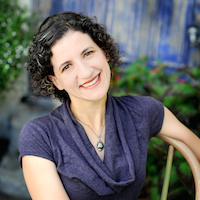I am sitting on the plane, while I wait for the remaining passengers to board. The woman next to me is talking loudly on her cell phone.
Airplanes, and airports, are ripe for this kind of conduct—where a person in close quarters decides to exhibit a behavior usually reserved for a private space.
I find myself fighting my urge to judge her behavior—fighting the urge to decide that, clearly, this behavior is bad, inappropriate, disrespectful or rude.
Then I land on something that feels closer to my truth…
I don’t personally enjoy her behavior. It is bothering me. But, it is not inherently bad. To judge it as such would be an opinion that masquerades as truth.
Sure, there are social graces. And sure, I can have my preferences about which social graces are important to me. But, the moment I decide that this woman’s behavior is across-the-board rude, rather than just bothering me, then I have crossed a line into judgment.
And it’s a line that we cross every day.
So, what’s the difference between judgment and your opinion?
I have been working to actively curb my judgment for the last decade. And let me make something perfectly clear. I catch myself nearly every day judging something. I can’t pretend that it’s natural or easy for me to release judgment. I have been conditioned, like so many others, by family and society to judge. Heck, perhaps I’m judging “judgment” right now!
So, one step at a time, I work my way closer towards non-judgment.
Why? Because, I have personally found that it leads me to more inner peace and acceptance. That being said, I still have very strong thoughts, opinions and preferences about pretty much everything.
So, let me explain the difference.
A thought, opinion or preference is rooted in you, your perceptions and your relationship to yourself and the world around you.
Something becomes a judgment when you take those thoughts, opinions and preferences and assign an inherent value to it.
Let me give you a really basic example.
My step-daughter was referencing cherry flavored things recently. She declared quite confidently, “Cherry is nasty!” I giggled and replied, “Oh, you think so? It’s actually one of my favorite flavors, so I guess that works out, for me, that you don’t like it.”
But, I thought quietly to myself (for once) how this was actually a perfect example to illustrate the above.
She may indeed think that cherry is nasty. What she is communicating is that she deeply dislikes the cherry flavor. She may dislike it so deeply that she cannot even fathom the idea of anyone else liking it. Therefore, it is clearly just all-around “nasty” to her. So, rather than define her dislike as a personal preference, it is assigned as an inherent quality of the cherry flavor.
Not a big deal, until she is face-to-face with someone who loves the cherry flavor, feels like cherry is being attacked and feels the need to defend the flavor. Once the gauntlet has been thrown, many feel the need to defend cherry’s honor to convince not only that person, but also generations to come that cherry rules supreme.
It doesn’t take a historian to explain how this type of thinking and behavior, assigning inherent value when personal preference would have sufficed, has been the source of many global conflicts.
Our world spends most of our days in polarized thought, assigning value to things as bad and good, right and wrong. Now, we can argue that assigning these values has helped to create some universal morality in human behavior, but we could also argue that assigning these values has distanced us from the truth.
For example, a woman behind me in the airplane sat down with her infant and said, “hopefully, she will be good on this flight.” How exactly does an infant be bad? I can assume she means, “hopefully, my infant will abide by adult social norms and not cry, so that she doesn’t bother others, which makes me uncomfortable.” But is her baby being bad when she cries and good when she doesn’t? Well, this mom sure thinks so, and I’m sure many others on our flight would agree.
And I don’t judge her or anyone else for assigning that label. We are programmed to view our world this way, with these polarized assignments of value. But that world view not only creates conflict with others and suffering on small and large levels, but it creates conflict and suffering within ourselves.
Since none of us wants to be bad or wrong, we begin to lie to ourselves about our personal qualities and habits. After all, if a certain habit or quality, such as how much we eat or drink, our sexual behavior, our spending habits or our stubbornness, is perceived as bad or negative in our culture or even within our family or social group, why on earth would we want to admit to ourselves or someone else that we have that habit or quality?
So, instead, we deny it. We push it away rather than just look at it as what it is: a quality of self. But what if we could refrain from judgment and just look at our personal qualities as neutral. What could happen? Might we, rather than get bombarded by feeling guilt and shame, be able to just address our true self?
I can tell you, from my vantage point, that the answer to that is yes.
Once we release self-judgment, one little piece at a time, we are more equipped to address who we actually are and how it affects us. And then a wondrous thing happen: we shift the qualities that we perceive as limiting and accept other qualities as gifts. No longer trapped within a cloud of shame and guilt and judgment, we are able to take the quality as it is—neutral—and shift it when appropriate.
And when we stop judging our self, we feel less of a need to judge others. We become more accepting of our personal preferences and we begin to see others choices as also just that—their preferences.
We feel less of a need to defend our beliefs.
We feel less of a need to prove ourselves.
We accept and honor others.
But, we still have our preferences. And mine is more silence next to me on the airplane.
And perhaps, like a cosmically-assigned reward for releasing one more judgment and seeing it for what it is, I spend the next leg of my very full flight with two, quiet, empty seats next to me.
~
Author: Susan Shehata
Editor: Caroline Beaton
Image: Flickr/David Goehring


 Share on bsky
Share on bsky





Read 2 comments and reply